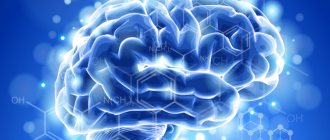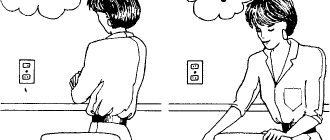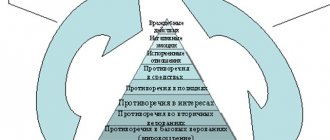The request for “Theory of Mind” is redirected here. A separate article is needed on this topic.
Wiktionary has an entry for
"psyche"
Psyche
(from ancient Greek ψῡχικός “mental, spiritual, vital”) is a complex concept in philosophy, psychology and medicine, which, depending on the fields of knowledge and areas of science, is defined as follows.
- A set of mental processes and phenomena (sensations, perceptions, emotions, memory, etc.); a specific aspect of the life activity of animals and humans in their interaction with the environment [1].
- “A form of active reflection by a subject of objective reality that arises in the process of interaction of highly organized living beings with the outside world and carries out a regulatory function in their behavior (activity)”[2].
- A systemic property of highly organized matter, which consists in the subject’s active reflection of the objective world and self-regulation on this basis of his behavior and activities[3].
- The inner world of a person.[4]
The psyche of animals is the subjective world of the animal, covering the entire complex of subjectively experienced processes and states: perception, memory, thinking, intentions, dreams, etc.[5]
The psyche is characterized by such qualities as integrity, activity, development, self-regulation, communication, adaptation, etc.; associated with somatic (bodily) processes. Appears at a certain stage of biological evolution. Man has the highest form of psyche - consciousness. The science of psychology studies the psyche[1].
Questions of the origin and development of the psyche
In the history of science, various points of view have been expressed on the place of the psyche in nature. Thus, according to panpsychism, all nature is animate. Biopsychism attributed a psyche to all living organisms, including plants. The theory of neuropsychism recognized the presence of a psyche only in creatures with a nervous system. From the point of view of anthropopsychism, only humans have a psyche, and animals are a kind of automata[6].
In more modern hypotheses, one or another ability of a living organism (for example, the ability to search behavior) is accepted as a criterion for the presence of a psyche. Among the many such hypotheses, the hypothesis of A. N. Leontiev, who proposed that the body’s ability to respond to biologically neutral influences should be considered an objective criterion for the presence of a psyche, received special recognition [ clarify
]. This ability is called sensitivity; according to Leontiev, it has objective and subjective aspects. Objectively, it manifests itself in a reaction, primarily motor, to a given agent. Subjectively - in the internal experience, the feeling of a given agent. Reaction to biologically neutral influences is found in almost all animals, so there is reason to believe that animals have a psyche. This ability to respond is already present in the simplest single-celled organisms, for example, ciliates[6].
In plants, science knows only reactions to biologically significant influences. For example, when plant roots come into contact with a solution of nutrients in the soil, they begin to absorb them. The ability to respond to biologically significant influences is called irritability. Unlike sensitivity, irritability does not have a subjective aspect [6].
In the evolution of mental forms, A. N. Leontiev identified three stages:
- stage of elementary sensory psyche;
- stage of perceptual psyche;
- stage of intelligence.
K. E. Fabry left only the first two stages, “dissolving” the stage of intellect in the stage of the perceptual psyche[6].
At the stage of the elementary sensory psyche, animals are capable of reflecting only individual properties of external influences. At the stage of the perceptual psyche, living beings reflect the external world in the form not of individual sensations, but of integral images of things[6].
The meaning of the word crazy
Examples of the use of the word crazy in literature.
If the doctors said that the anti-adviser is crazy, then what is there to judge and dress up about his ideas?
One aphorism without meaning is graphomania, two are the nonsense of a psycho, three are the gift of a genius, four are the mockery of God, and the rest are a nightmare, a nightmare.
Titus, the great Blatmaster, found inexpensive housing for Ilyin, installed him in the boiler room, labeled him as a passportless, rootless, memoryless, almost psychotic, if you believe the doctors, who didn’t understand a damn thing about Ilyin’s illness, pumped him up with medicine, got him back on his feet - go , falcon, live for now, and if you believe the hillocks from Hebe, then the spy was hanged on himself by a loyal citizen of EReNESeR, otherwise - the Russian National Socialist Republic, in common parlance - Russia.
When Sacco and Vanzetti were executed, he led a protest march and was sent to a mental hospital for it.
I'm afraid this is not a vendetta at all, and Tangorn is by no means a crazy person, we're just not able to figure out his plan.
About the efficient guys from the Admiralty, who dug out from the archives the insane, as it was believed, memos of the inveterate psycho Vincent, who had been sent to the very outskirts of the empire.
He scolded the secretary on the phone, who thought it was very witty to connect with him all the psychos, drunks, jokers and housewives who asked for Woodward, Bernstein, Hoffman or Redford.
No, dear Dan, you’re crazy, complexed, it’s time for you to get a ticket to the Dr. Gannushkin Institute - to the department of borderline conditions, where the same nervous idiots in flannelette pajamas are strolling around, eating seduxen and drinking Borjomi.
Natalya imagined the long corridors of the Gannushkin hospital, crowds of psychos in mouse robes and her unfortunate husband, for some reason dressed in a canvas straitjacket.
Kate, like most, believed that in reality it was much simpler - just some clueless lunatic got lost while walking around the neighborhood and scared the crap out of two old ladies passing by, and the rest was made up by the moronic, slobbering reporters from Wapping Street.
Why did they build a whole house with mayonnaise elevators for such a thing and fill it with all sorts of crazy people?
If in a war you start to figure out why, because of whom, why, who is alive and who died, you will become a psycho.
Among the thousands of calls, there were calls from crazy people, unstable people, hooligans, optimists, hopeful people, helping people, and just officially recognized crazy people.
Lieutenant Konoe is a psycho,” Brent Ross said as he buttoned the last button of his clean green shirt.
And what thought will hit the crazy lieutenant’s head - neither a crazy person nor a healthy person can predict this.
Source: Maxim Moshkov library
Basic functions of the psyche
Kostin A. N. and Golikov Yu. Ya. identified three main functions of the psyche: cognitive, relational and regulatory.[7] At the same time, cognitive and regulatory are classic; their purpose is to carry out cognitive processes, as well as to initiate and organize activity. In addition to them, the relative function of the psyche is highlighted, its purpose is to develop subjective relationships to objective reality and focus on its required changes. According to their content, these relationships are divided into two types: emotional and meaningful.
Chapter 1. What is the psyche?
So what is “psyche”, in the most general form to begin with? I pose the question in a general way, based on the objectives of my research: to study layer by layer what has entered my consciousness, starting with the most general or popular knowledge. Naturally, the most general and popular knowledge of psychology is presented in dictionaries and textbooks. This is what I will limit myself to in this part of the study.
It is also necessary to start with the most general concept of the psyche because this difficult concept is avoided by the very Sciences that created it.
By the way, it should be noted that not only Psychiatry, Psychotherapy and Clinical Psychology avoid it. Recently, as they say, there has been a tendency to avoid this concept in general Psychology. In any case, I increasingly come across psychological dictionaries - Russian and foreign - where the psychological-everything-anything is there, but the psyche is not. Apparently, psychologists also had to think about their subject, and they got so confused that they decided to form a conspiracy of silence, simply not mentioning or discussing this elusive psyche anymore. And Psychology is the only Science that has studied it.
Fortunately, there are still Belarusians in the world who, on the one hand, write many new books, and on the other, faithfully preserve all possible traditions. Oh, Belarus, the dream of my soul! As an ethnographer, all my life I wanted to visit Polesie, a reserve of traditional culture, where in Soviet times half of all collections on Slavic ethnography were made. This is in the same Polesie region, which in relation to Russia is the West and almost the center of Europe!
And even now Belarus remains faithful to traditions - it is the only one that still dreams of reviving communism or the Soviet Union, I don’t remember exactly what. And it also traditionally preserves in its psychological dictionaries the concept of “psyche,” which is a legacy of Soviet psychology. This fidelity to traditions makes Belarusian Science radically different from Russian Science, which has become too Americanized.
I will begin my study of the concept of “psyche” with Belarusian dictionaries, since they are the newest, and therefore should provide the most modern views on this subject. “Psychological Dictionary-Reference Book” by Dyachenko and Kandybovich (Minsk, 2001), makes the following attempt to define the psyche:
Chapter 1. What is the psyche?
“Psyche (from the Greek soul) is a property of animals and humans that performs orienting, controlling, adaptive, motivating and meaning-forming functions in behavior and activity.”
I will break the dictionary entry into parts, according to steps of thought, to make it easier to understand what its authors are saying. I’ll leave out the animal psyche for now.
So, the psyche is a property of a person.
This is similar to a definition, but if it is a definition, then such a definition, by and large, does not give anything if you do not know what a person is. This dictionary also gives a definition of the concept “person”, but, as you understand, this definition cannot be working, because such a concept as “person” cannot be contained in a short dictionary entry. Therefore, we will have to discard it and leave a short definition: the psyche is a property.
Such a definition is philosophical, and the authors of the dictionary were unlikely to intend to give a philosophical definition, otherwise they would have included an article giving a definition of the concept “property”. But he's not there. And this means that here “property” is understood in its usual meaning. What do we usually mean by property? I myself would answer something like this: a property is something that is characteristic of someone, that is, someone has, is his own.
In other words, people have a psyche And since the authors of the dictionary define a person as a being, then this entire initial definition of the psyche means only the following: If you want to understand what the psyche is, look for it in living beings, in people in particular. She meets there. With this joke I want to show that the definition “psyche is a property of living beings” is not a definition. This is just an indication of the place of existence of the psyche.
The authors, apparently, were not satisfied with this beginning themselves, because their entire article consists of repeated attempts to define this concept. But first they write the following:
“In animals, the manifestation of this property has significant limitations compared to humans, who are endowed with speech, consciousness, self-awareness, creative abilities and in whom this property appears in pronounced subjectivity.”
(Ibid.).
What are the authors doing here? They do not at all define a concept, but produce a description of those phenomena that can be observed by a person who has decided to define the psyche. In other words, their train of thought can be conveyed as follows: since it is impossible to define the psyche right away, let’s step back to the beginning and list those phenomena that we usually consider mental.
Concepts are born as generalizations of some observations. This is a completely correct line of research. And it is natural to expect that enumeration will lead to a new definition. What are listed as phenomena through which the psyche appears to us?
Speech, consciousness, self-awareness, creative abilities, subjectivity and the original basis are the animal psyche, which obviously exists in humans. From this listing follows the following definition:
“The psyche is the result of the development of life, a form of life activity of living beings.”
At first glance, there is no particular connection with the previous listing. But take a closer look: the difference between the human psyche and the animal one suggested to the authors that the psyche develops, and since it develops from animals to humans, then it is connected with human life or vital activity. However, I will highlight the essence:
First. The psyche is the result of the development of life. This again is not the definition of the psyche. This is an indication of where to look: look for the psyche where there is life, developing from simple to complex species.
Second. Psyche is a form of life activity. What is vital activity? Here the authors again became unjustifiably philosophical. Unjustified, because they did not think about this issue and did not give an entry for “life activity” in the dictionary. This means that they again used this concept in an everyday sense.
True, they have an article “activity”, but it does not have much in common with “life activity”: “Activity
-
the motivational process of using certain means to achieve a goal.”
And then everything about human activity in society and as a social being.
What is “life activity” in the everyday sense? Yes, almost life. But since the expression “form of life activity” is used here, then we are not dealing with life, but with the observation of it, because “form” is a type, translated into Russian. And since it is a form, it means that something appears to someone, looks a certain way - as a vital activity, for example.
And if this is so, then the definition takes on the following meaning: “You can discover the psyche by observing the life of living beings.” This means that this again is not a definition of the psyche, but only a finger pointing to a definition.
What to do? There is nothing left to do but listen to this hint and start observing again, considering the first observation insufficient. And the authors do exactly what the internal laws of their own reasoning dictate to them. They once again list the phenomena of the psyche, but in much more detail.
“The human psyche includes: processes (cognitive, emotional and volitional), states (exaltation, doubt, depression, depression, etc.), properties (direction, temperament, character, abilities), experience (knowledge, skills, abilities, habits ).
Processes, states, properties and experience are in unity and form a hierarchical system, the leading role in which belongs to mental properties.”
(Ibid.).
What is listed here? Processes. What are processes? The authors, of course, do not define it. But the word has been living in the Russian language since the middle of the 19th century.
Chapter 1. What is the psyche?
In Dahl's time it meant the same thing as procedure. And the procedure is a procession, a move // any long, consistent business.
At the beginning of the twentieth century, Efremov’s Dictionary of Foreign Words, edited by Baudouin de Courtenay, defines a process as “the interaction of forces, expressed in the movement, modification or transformation of matter // in general, a set of phenomena, functions or actions necessary to achieve a known goal.”
And at the end of the twentieth century, Ozhegov’s “Explanatory Dictionary” gives the following definition:
"Process
-
the course, development of some phenomenon, a consistent change of states in the development of something.”
In short, to say that “the psyche includes processes”
- it’s the same as openly admitting that you don’t understand what you see: I’m looking intently, and there’s always something moving, something changing... I don’t understand anything.
However, the use of the term "processes" is a long and well-established tradition in Psychology, which lulls itself into such illusions of knowledge. Therefore, I will not find fault with the authors and will simply list what the observation brought us this time. So, the psyche includes: states, properties, experience, hierarchy, which allows you to feel that the psyche is something unified. And yet, there is something moving and changing all the time, that is, it remains unknown. Despite the obvious insufficiency of this observation, it still allows us to make the following definition of the sought-for concept.
"Psyche
-
a system of internal regulators of human activity in a changing and complex environment, when it is impossible to get out of a situation (survive) only due to the body’s reactions to environmental signals, but you need to have a stable model (picture of the environment) and the subject himself”
(Dyachenko, Kandybovich ).
As you understand, this definition does not grow entirely naturally from the previous observation, but appears as if in a qualitative leap. But this is not the authors' fault. This is a property of a dictionary entry. There is no room for consistent reasoning here. Some things have to be left out.
As for the definition itself, despite some clutter with incomprehensible or seemingly understandable foreign words, it is good in its own way. But to make this obvious, let’s read the following thought from the authors:
"Ultimately, the psyche
is
a system of subjective models (images in the broad sense of the word) of the world located outside the subject.
The psyche is the work of the human nervous system. If we don’t forget about this, then we can use the common Slavic term “soul” to designate the psyche.”
(Ibid.).
It is precisely for the sake of this last note that I cited the entire article by Belarusian authors. Thanks to him, the circle closed and the most recent definition closed with the very first, so to speak, with its root or source. It closed, however, boorishly, as is generally characteristic of Science. Judge for yourself.
Initially, the word psyche does not come from the word psyche - soul, but from the word psychikos - spiritual. This means that Science initially did everything to dissociate itself from the soul and prove that it does not exist. From the point of view of Psychology, Science killed the soul as a phenomenon and concept of folk culture. Then she developed her own concept - "spiritual" or "psychic", which does not mean "relating to the soul" but "relating to the nervous system." And now he suddenly declares: Rejoice, oh, fellow scientists and mere mortals. We have so surely killed the soul that there is no longer any need to fear its return! And if earlier we were afraid to use her name, so as not to evoke the spirit of the murdered person and sow confusion in the minds of the flock, now it is no longer dangerous, now we can even rob the grave and take away everything that is left of the soul. Is there only one name left? So we use a name to call what we do. Even a tuft of wool from a black sheep! But still, do not forget that when speaking “soul”, Psychology is talking about the work of the human nervous system!
Well, find another word instead of rudeness, if I'm wrong. I'm even ready to apologize to the winners. They are not being judged.
As for the definition, let's divide our subject into two parts. For the soul and psyche. I will leave the question of what the soul is for a separate study. But by soul I mean the soul, even if it is a vague concept. But the psyche is the adaptation of the human nervous system to living conditions and the difficulties of survival in the environment.
Gods war. This definition of the psyche seems to me quite acceptable, and I consider it a certain merit of Science, including the authors of the dictionary. The only thing that an ordinary person needs to keep in mind when he reads the definition of the psyche is the reasoning that scientific Psychology has done beyond what falls into our hands for reading.
Once upon a time, at the very beginning of the development of the scientific method, young and boorish Science clearly stated: I do not need the hypothesis of God for my constructions! Accordingly, in the soul hypothesis! And therefore, I set myself the task of proving that everything that we know as the complexities of the human spirit, the heights of mental life, insight and providence, can be explained without resorting to any external forces from the mere mechanism of adaptation of life to the conditions of survival in the environment!
And for several hundred years now, Science has been persistently struggling with this task. No, not the task of describing the natural structure of man, but the task of proving that everything in man can be explained without the hypothesis of the soul. Well, for the last century she has been struggling with how not to completely disgrace herself, how to save face, since everything is not there and there is neither the promised communism, nor an understanding of how man works...
Chapter 1. What is the psyche?
Science, having turned into a community, became extremely unscientific and enshrined this in its traditions. She lives by them. Maybe I'm wrong about something here. Judge for yourself. But I understand science this way: since you are busy searching for the truth, that is, you want to understand what reality is, then you cannot proceed from beliefs. Therefore, you cannot be sure that there is no soul until you have made the appropriate research. And while you are doing it, you must assume with equal probability that the outcome of the study may turn out to be both negative and positive.
Is science scientific, which initially stated: I am convinced that all ideas about the soul are false, and I will prove it?! What does she do? By defending party guidelines, that is, the beliefs of your community? Where is the truth? And what does reality have to do with it?
There may not be a soul, or perhaps there is one. Until we have received actual knowledge, we will make the assumption that humanity really saw something when they talked about the soul for thousands of years. At the same time, let's reduce the volume of the material under study to that part of it where there is definitely no soul. And there is the work of adaptation of living beings, in particular, their nervous system, to the conditions of survival in this world, which has been shown with all reliability by Science.
And let’s define for ourselves: we call the psyche, more precisely, today Psychology calls the psyche precisely the work of the nervous system, adapting to the environment.
This definition with a mention of Psychology is fundamentally important, because I hope you have already understood that psychologists very often use some words and expressions almost thoughtlessly in their everyday meaning. Because of this, those who read them get the impression that the psychologist is talking about the same thing that I am thinking about. And as a result, the conclusions of Psychology, which relate only to that part of it where it is a science in the true sense of the word, spread to our lives. This reveals the duality of Science; after all, it is not only a search for truth, but also a community that wants to live well-fed and respected.
Because of this confusion, we begin to think that the conclusions of Science apply to all life phenomena. What is scientific is true! Because of this belief, everything that Science has found for its internal use, due to linguistic inaccuracy, becomes generally valid for us. And if she has found a certain field of research where she can explain some of the mental phenomena based solely on an understanding of the functioning of the nervous system, then Science has proven that there is no soul!
No, brothers! It won't work like that. There are still many fields left for exploration that our sages never dreamed of. Why? Yes, because these are the fields of human ideas about the soul, and Psychology is a science not about the soul, but about the psyche, in the sense of the work of the nervous system. She didn’t study anything related to
So explore and explore. Psychology has done almost nothing yet, and there is no end to the work.
As for my study of purification, in this regard I can draw a certain conclusion: if I understood Psychology correctly, then the psyche in the sense in which Psychology understands it is inaccessible to purification. Rather, it must be repaired, as Psychiatry and Clinical Psychology consider it. Within the nervous system there is no place for contamination. Shouldn't you shake off the dust from the wires? Is this why it is not possible to get rid of mental illnesses because they are trying to repair them, not clean them out?
But in order for purification to become possible, there must be something - a thing or environment that can be a carrier of impurity, and therefore accessible to purification.
In other words, does the psychological understanding of the psyche as the work of the nervous system cover the entire concept of “psyche” as mental activity? And aren’t there even hints within the framework of the same psychological theory that psychologists themselves understand the psyche more broadly than is assumed by their own initial attitudes? In other words, research integrity forces me to study in more detail what Psychology understands by the psyche.
Chapter 2. Search for a different psyche
Where can we look for hints about a different understanding of the psyche by psychologists? Everything is in the same dictionaries because they reflect the views of the scientific community or parts of it that were established in a certain era. I won’t even turn to the classics, because for now I’m only interested in those opinions of Science that could influence public ideas. This means they were publicly available.
If we start with dictionaries, then the starting one for Russia will be the “Psychology” , edited by Petrovsky and Yaroshevsky. The original and the only one for the majority, since it was the most accessible and, since 1985, introduced the ideas of Soviet Psychology into the minds of Russian people as the word of truth. I don’t know who exactly wrote the article “Psyche” for him, and therefore I will consider the Dictionary itself as the author. Petrovsky and Yaroshevsky would never have allowed anything into it that did not correspond to the established views of the psychological community. So he's very personable.
So, “psyche is a systemic property of highly organized matter, consisting in the active reflection
the subject of
the objective world, in the subject’s construction of a picture of this world that is inalienable from him and self-regulation on this basis of his behavior and activities”
(Psychology. Dictionary / Under the general editorship of A.V. Petrovsky, M.G. Yaroshevsky).
Chapter 2. Search for a different psyche
Hey Belarusians! - I want to exclaim. After all, how traditional they are and at the same time how new they sound. Take just one line from the dictionary of Petrovsky and Yaroshevsky and expand it to a whole page! That's right, well done! Well, at least now I have no doubt that in the previous chapter I described a concept that actually exists in Psychology.
But for the dictionary of Petrovsky and Yaroshevsky, the definition of the concept of “psyche” is just beginning. And note that it begins as a philosophical one: the psyche is a property of highly organized matter. In other words, psyche is a property of a certain type of matter. Matter, as you already guessed, is not defined by the dictionary, which means it was borrowed from some earlier sources. Obviously philosophical.
But if he had not borrowed, if he had really thought about it philosophically, then he could have been asked the question: can a part of matter have a property that all matter does not have? Come on, after all, the dictionary is written by psychologists. Why bother with them!
However, if we return to the definition, the statement: “psyche is a property of matter” cannot be considered a definition. This is just an indication of where to look for it - the psyche is characteristic of matter, which means we will look for it in a certain type of matter called the “subject”. What is a subject?
The dictionary explains: “subject (from Latin subjectum
-
subject)
-
an individual or
a group as a source of knowledge and transformation of reality; carrier of activity." (Ibid., p. 389).
It seems that Soviet Psychology, the culmination of which was the Dictionary, while fighting with Western idealistic Science, set itself the task of proving that it knows Western words better than the West, and even long ago surpassed it in this and moved on. Do you know how this definition of the subject continues?
“Idealism in all its manifestations sees the source of the subject’s activity in himself. Dialectical materialism, as the philosophical basis of scientific psychology, considers the subject as a product of historical development and connects its activity with the characteristics of human activity.”
(Ibid., p. 389).
I have to fuck you up so much with my linguistic quirks that in the end, when I come across a Russian word in its usual meaning among psychologists, I don’t recognize or understand it. The subject is the carrier of activity! Well, what can this mean?! It turns out that everything is very simple, the carrier
- this is a bucket or a donkey, that is, something that is worn or carried on. These are idealistic fools who believe that “the source of activity is right within you.” But in reality, it is only carried in you, you are a temporary transfer instrument needed to transfer activity from its source to the consumer. What is this activity? She is already starting to scare me if I live only to deliver it to someone who is waiting for me beyond the line of death or, even worse, robbing me
I'm invisible right in life!
“Activity is a universal characteristic of living beings, their own dynamics as a source of transformation or maintenance of vital connections with the outside world; inherent in a living being
the ability
to
“independent
reaction force” (F. Engels)”
(Ibid., p. 14).
I'm completely confused. Is this the same Engels or is it one of the idealists unknown to me?
To tell the truth, I have long had a special opinion about Idealism and Materialism. Having studied Science for many years from the point of view of its psychology, I came to the conclusion that a materialist is a person who believes in idealism. And the materialist psychologist not only believes, but as a highly organized part of Science has the property of limiting his perception by some artificial wall, behind which invisible, ideal things begin for him. An idealist is a person who believes that the whole world is one, and even ideas or eidos have a certain level of materiality. They can be seen and even, in a sense, touched. Therefore, I will no longer pay attention to the attempts of Soviet psychologists to divide their world into Materialism and Idealism, but will judge them only by the purity, clarity and consistency of reasoning.
So what happens with this approach?
Psyche can be found in “a certain part of matter.” Namely, in subjects, that is, “individuals or groups,” which obviously means: in people, “carriers of activity,” that is, “independent force of reaction.”
The concept of “response”, close to reflection, inevitably leads us to those methods of describing the work of the nervous system that are accepted in neurophysiology. In other words, this definition already sounds familiar to us:
Previous12Next
Notes
- ↑ 12
Psyche // Big Encyclopedic Dictionary. 2000. - Psyche // Big psychological dictionary. — M.: Prime-EUROZNAK. Ed. B. G. Meshcheryakova, acad. V. P. Zinchenko. 2003.
- Golovin S.Yu.
Dictionary of a practical psychologist. - Minsk: Harvest, 1998. - 800 p. - Mazilov V. A. Subject of psychological science and philosophy of psychology / Fundamental and applied research of modern psychology: results and development prospects / Responsible. ed. A. L. Zhuravlev, V. A. Koltsova. – M.: Publishing house “Institute of Psychology RAS”, 2017. – 2714 p. — pp. 108-115 ISBN 978-5-9270-0362-4
- Animal psyche // Psychological Dictionary.
- ↑ 1 2 3 4 5 Gippenreiter Yu. B.
Origin and development of the psyche // Introduction to general psychology. M., 1996. - P. 169-197. - Kostin A. N., Golikov Yu. Ya. Introduction of the relative function into the composition of the basic functions of the psyche / Fundamental and applied research in modern psychology: results and development prospects / Responsible. ed. A. L. Zhuravlev, V. A. Koltsova. – M.: Publishing house “Institute of Psychology RAS”, 2020. – 2714 p. — P. 92-100 ISBN 978-5-9270-0362-4
Reasons for the problem
There are several impetus for the development of such a pathology. One can be a ban, or rather, prohibitions. Auto-aggressive actions are typical for children aged 3-4 years, who react in this way to a parental “no”. Another reason is a lack of love and care. In this case, we are talking about the fact that a person feels unnecessary, looks for reasons for this in his not very good behavior and punishes himself.
Another reason is humiliation. If a child or adult is bullied, humiliated, experiences ridicule and inattention to his problems, the mechanism of self-blame and destruction may turn on. There are frequent cases of self-aggression in conflict situations. “Manifestations of auto-aggression can be different. In the practice of working with children and adolescents, we often encounter the fact that manifestations of auto-aggression are associated with elements of manipulation of people around them. A child may bang his head against a wall or bite himself if something is not given to him; adolescents may also harm themselves for show, “so they can see how I can do it.”
Old robbers. Where does aggression come from in older people? More details
The initial manifestations of such behavioral disorders can be corrected by psychological means. There are cases when children really do not know other ways of communication, do not know how to communicate and interact constructively, do not know how to negotiate and explain to their interlocutor in words the reasons for their conditions and the best options for solving problems. The methods of communication set by the family environment play a major role in the formation of negative behavior patterns. We primarily focus our efforts on them when constructing correctional work. An authoritarian parenting style, for example, can also provoke manifestations of auto-aggression,” emphasizes Elena Makarova.
Sometimes, with the help of auto-aggression, a person tries to cope with the feeling of guilt that torments him. Self-punishment brings him relief. True, it is temporary. It is best to act differently if there is an understanding that the psyche is working against its own body. “If you are faced with auto-aggression, you need to consult with a specialist about the possibilities and methods of correcting it. In case of auto-aggression in childhood and adolescence, specialists from children's centers will be able to offer you high-quality advice. If we are talking about adults, then we need to contact those who work with people of that age,” the psychologist advises.
Article on the topic
Eyes are wet. Why are we sad and what to do with this feeling
Clinical picture
If we talk about the external manifestations of the problem, doctors identify the following signs:
- unconscious tendency towards risky behavior;
- destructive habits;
- improving the body with extreme persistence;
- deliberately refusing to eat to make others feel guilty;
- sacrificial behavior;
- self-accusation, invented suffering, shyness bordering on unhealthy, increased sense of duty, chronic feeling of resentment.
Often, mental problems, when emotions in relation to external measures are suppressed and redirected to oneself, lead to malfunctions in the body at the physical level: problems with the heart and blood vessels, increased blood pressure, problems in the digestive system, etc. So don’t It’s worth engaging in self-flagellation; it’s better to focus your efforts on finding a good specialist and deal with the problem at a professional level. Then life will receive new colors, and nothing will threaten your health (both physical and psychological).











